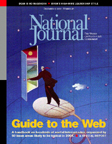
DEFENSE
Web Sites On Weapons of Mass Destruction

Main Story & Other Topics Recommended By: John Pike Director, GlobalSecurity.org nuclearweaponarchive.org Pike says his favorite site is the Nuclear Weapon Archive, maintained by arms expert Carey Sublette. He says it's "the essential reference work on all things related to nuclear weapons" and a "hand-coded, one-person labor of love." |
© National Journal Group Inc.
Friday, Dec. 5, 2003
ceip.org/npp
Led by project director Joseph Cirincione, the Nonproliferation Project of the Carnegie Endowment for International Peace has established itself as the full-service Web site for studying weapons of mass destruction. It provides country-by-country assessments of WMD capabilities, strategic analyses for coping with today's proliferation crises, and daily links to the latest news. Cirincione was a trailblazer, recognizing the Web's potential long before others in his field did. This site reflects his experience at making voluminous information easily accessible.
globalsecurity.org
GlobalSecurity.org mounts an extensive site covering the full spectrum of WMD issues, but providing a unique focus on U.S. weapons-of-mass-destruction capabilities and policies. Want to know the status of Minuteman III ICBMs in North Dakota? Check this site first. Look here also for fresh satellite imagery of possible nuclear sites in the "axis of evil" nations. John Pike, another Web pioneer, heads the site and ensures an exhaustive supply of information.
www.iaea.org
The International Atomic Energy Agency is the international community's sole multilateral tool for dealing with such nations of concern as Iraq, Iran, and North Korea. The agency has just revamped its Web site, which is an excellent place to monitor international efforts to corral nuclear proliferators. Covering the spectrum from general information to technical arcanum, the site provides links to the latest news stories as well as details on nuclear power plants and research labs around the world.
www.un.org/depts/unscom; unmovic.org
Did Iraq have WMDs before this year's U.S. invasion? The Bush administration said yes and pointed to Baghdad's refusal to cooperate fully with U.N. inspection teams, and to the piles of weapons unearthed and destroyed by those teams following the 1991 Gulf War. War opponents said no and pointed to reports from the same inspectors. Judge for yourself by reading the original documents at the sites of the U.N. Special Commission on Iraq and the U.N. Monitoring, Verification, and Inspection Commission.
isis-online.org
Science-based analysis of WMD proliferation issues can be tough to find when political ranting is so easy. That makes Institute for Science and International Security President David Albright, a physicist and former U.N. inspector in Iraq, a unique resource on the Web for understanding today's nuclear nonproliferation hot spots.
cia.gov
What did the president know, and when did he know it? Responsible for delivering the president's daily intelligence briefing, the Central Intelligence Agency posts unclassified twice-yearly assessments of the WMD capabilities of nations that worry U.S. policy makers. In addition, you can find the annual testimony that top intelligence officials give to Congress and, occasionally, a declassified portion of actual national intelligence estimates provided to the White House.
usinfo.state.gov/usinfo/products/washfile.html
Information on official U.S. policies to fight WMD proliferation is spread throughout many government Web sites, but try starting with the State Department's "Washington File." It's a fairly complete list of official statements and documents, posted ostensibly for the foreign press but available to all.
cns.miis.edu
With an exhaustive site providing comprehensive information on nuclear, chemical, biological, and radiological weapons, the Center for Nonproliferation Studies, part of the Monterey Institute of International Studies, steers more toward analyzing WMD proliferation than simply describing the problem. The center produces thoughtful studies to determine which prevention strategies work and which ones don't.
npec-web.org
In an effort to balance traditional approaches to WMD proliferation, Henry Sokolski, a Defense official in President George H.W. Bush's administration, created the Nonproliferation Policy Education Center. The center's advisory papers articulately urge the United States to pursue a harder line with potential proliferators than most arms control groups recommend.
Copyright 2003 by National Journal Group Inc.
1501 M St., NW #300 Washington, DC 20005
202-739-8400 · fax 202-833-8069

